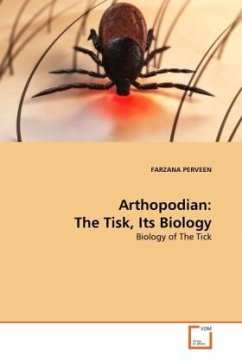
Arthopodian: The Tisk, Its Biology
Biology of The Tick
Versandkostenfrei!
Versandfertig in 6-10 Tagen
32,99 €
inkl. MwSt.

PAYBACK Punkte
16 °P sammeln!
Ticks are blood feeding external parasites of mammals, birds, and reptiles throughout the world. Ticks appear to avoid direct contact with water. All general-purpose operating systems (GPOSs) use periodic clock interrupts called "ticks" to regain control and measure the passage of time. An idle "crippled" laptop (disconnected from its screen and hard disk) consumes 4W due to ticks, and more, for increased tick rates. Twelve species of ticks are known to occur in Ohio. The brown dog tick, Rhipicephalus sanguineus, is the only species that can become established as a pest in homes and kennels. T...
Ticks are blood feeding external parasites of mammals, birds, and reptiles throughout the world. Ticks appear to avoid direct contact with water. All general-purpose operating systems (GPOSs) use periodic clock interrupts called "ticks" to regain control and measure the passage of time. An idle "crippled" laptop (disconnected from its screen and hard disk) consumes 4W due to ticks, and more, for increased tick rates. Twelve species of ticks are known to occur in Ohio. The brown dog tick, Rhipicephalus sanguineus, is the only species that can become established as a pest in homes and kennels. The expanding range of I. dammini appears to drive the present outbreaks of zoonotic disease in eastern North America that include LD and human babesiosis. Human granulocytic anaplasmosis, former ehrli chiosis, is a tick-borne zoonosis of increasing recognition. Relatively low A. phagocytophilum seroreactivity among professionally exposed to tick group of forestry workers despite high A. phagocytophilum infection level in the competent vector I. ricinus ticks.












